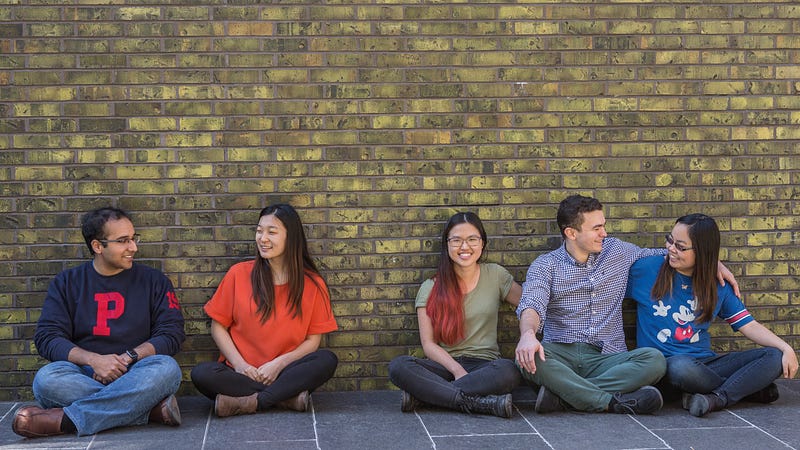Hack4Impact: A Global Coding Force for Good

There’s a multiplier effect when Penn students combine their programming capabilities and commitment to social justice in order to help nonprofits further their mission.
“We have a vision for how we want social impact to be a focus for technology,” says Katie Jiang (CIS’20), co-director of Hack4Impact, a student-led club founded at Penn in 2014 that, together with partner chapters around the country, has helped nearly 40 nonprofits in Philadelphia and beyond. “We want to engage more students at Penn and at other universities in social impact to empower nonprofits with programming solutions that will help them grow, become more efficient and achieve their goals.”
Participants in Hack4Impact, a creative and dedicated cadre of 30 Penn students, spend 5 to 15 unpaid hours weekly developing web-based applications that help nonprofits access, share and analyze complicated, changing data sets. Choosing from dozens of nonprofit applications, they select five coding projects each semester, prioritizing opportunities to create broadly useful, replicable programs for nonprofits whose missions they are passionate about advancing.
“My Hack4Impact experience has been really special and one of the best parts of my time at Penn,” says Jiang. “It has expanded my mindset beyond the technical work of being a software engineer to thinking and caring more about real-world problems, and how to support the nonprofits that are working to address root causes. We’ll see where that takes me in life.” In addition to furthering participants’ programming, product development, leadership and peer mentoring skills, their Hack4Impact experiences reflect how students draw upon Penn resources to engage civically.
HAPPY DANCE
During a recent video call with Sally Matsuishi, executive director of Next Generation Scholars of San Rafael, California, Jiang led a demo of the program her team developed to help the nonprofit support low-income high school students through each step of the college application process. “We could see her do a happy dance,” says Jiang. “Her excitement was contagious. It’s so fulfilling, so fun for me to see the impact.”
Abhinav Suri (B’19, CIS’19), Hack4Impact co-director, led another potentially game-changing project for Madaktari Africa, a nonprofit in Tanzania. To address the scarcity of medical specialists in this sub-Saharan nation, Madaktari Africa recruits U.S. medical specialist volunteers who train Tanzania’s more generalist medical teams, building in-country capacity for urgently needed specialty care such as neurosurgeries for auto accident victims and cardiac telehealth screening in remote areas.

After a surge in volunteer sign-ups last summer, Madaktari Africa’s computer system became so overloaded that the nonprofit halted new registrations. Suri, a pre-med student, contacted the nonprofit at the start of Penn’s fall 2017 semester and offered Hack4Impact’s assistance in developing an efficient volunteer management program, slated to launch in 2018. “We have high hopes this will support a meaningful experience for volunteers while facilitating real change on the ground,” says Maarten Hoek, Madaktari Africa’s managing director.
Another recent project for the ACLU of Pennsylvania gave Stephanie Shi an opportunity to apply knowledge gained in NETS 212, Scalable and Cloud Computing. Shi, a sophomore in the Jerome Fisher Program in Management & Technology (M&T), built scalability into the program that her team developed to help the ACLU efficiently review public records to proactively identify issues and trends that merit on-the-ground investigations. “These analytic tools will make it easier for us to do our work and to identify troubling trends in the judicial system,” says Andrew Christy, ACLU attorney and Independence Foundation Fellow.
Dhruv Maheshwari (M&T’15) co-founded Hack4Impact in 2014 with Ali Altaf (CIS’15). “This was the perfect intersection of my business and computer science academic work with the social impact and nonprofit experiences I had as a Penn Civic Scholar,” says Maheshwari. “It was the culmination and proof that I had learned something at Penn, that there is a meaningful way to tie these disciplines together.”
TANGIBLE BENEFIT
Because Hack4Impact cultivates a close-knit, potentially life- and career-changing community on campus, the club caps membership at 30 students who are selected not just for their computer coding capabilities but also for their commitment to social impact. “We can teach anyone how to program and how to do the specific things that make projects successful from a technical standpoint. But we can’t teach anyone the passion for benefiting one’s own community,” says Suri.
Hack4Impact also pushes for greater diversity. “We actively work to recruit and serve as a supportive community for underrepresented minorities in computer science and take care to address biases society has about people of color and women in STEM,” says Shi. “These are some of the most brilliant, hardworking and down-to-earth people I know. They motivate me to become a better person, and Hack4Impact has solidified my conviction that I want to work in areas where I can use my skills to benefit others in tangible ways.”
Students regularly debate whether to maintain the membership cap. Their concern is that these benefits may not scale with more participants, lessening their impact. Hack4Impact is instead growing by opening seven new chapters at other universities, including Georgia Tech, the University of Michigan and the University of Illinois at Urbana-Champaign. Unlike many coding clubs, Hack4Impact is unique in offering a trifecta of volunteer-ready projects for nonprofits, startup mentoring and support, and connections to a growing national network of purpose-driven coders.
Over the next five years, Hack4Impact’s alumni board aims to launch an annual summer conference, create paid fellowships to develop high-potential projects and establish new chapters at tech companies. “Five to ten years from now, our vision is that we’ll become a community of 1,000 alumni who will be change-makers and are passionate about social impact,” says Maheshwari. “It’s exciting to see our initial idea take root and inspire more students.”
